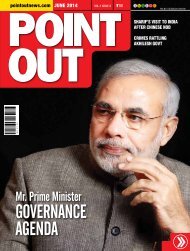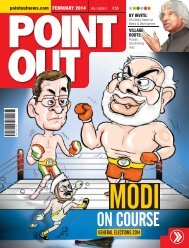You also want an ePaper? Increase the reach of your titles
YUMPU automatically turns print PDFs into web optimized ePapers that Google loves.
»»<br />
Surya Gangadharan<br />
he Navy is under tremendous<br />
pressure," said the former vice chief<br />
“Tof naval staff. "I've commanded<br />
ships that were 30 years old and we had to be<br />
extra careful. The same problem is with the<br />
submarines, they are old and getting older.<br />
No matter how careful you are things can<br />
happen."<br />
Things can and did happen. After<br />
two officers died of asphyxiation on<br />
the INS Sindhuratna in February, Navy<br />
Chief Admiral DK Joshi quit, taking<br />
moral responsibility for that (and other<br />
mishaps). His action was unexpected<br />
but not without precedent: In 2005<br />
Admiral Arun Prakash offered to resign<br />
over the naval war room leak case. The<br />
government refused to accept it.<br />
Admiral Prakash, many years Joshi’s<br />
senior, lauded his decision to resign.<br />
“The tradition in India is not to own<br />
up moral responsibility. Most of the<br />
accidents were trivial incidents like a<br />
ship touching a jetty or a submarine<br />
being caught in low tide, for which a<br />
chief cannot be held responsible. Our<br />
politicians and bureaucrats should take<br />
a hint from Admiral Joshi's conduct."<br />
But Prakash and Joshi are in a<br />
minority. No air chief ever took<br />
responsibility for the repeated crashes<br />
of MiG-21 aircraft and the loss of so<br />
many pilots. Nor for that matter did any<br />
defence minister or defence secretary.<br />
As Admiral Prakash put it, “had the<br />
government ensured actual integration<br />
of Naval Headquarters with the MoD,<br />
the latter should have borne collective<br />
responsibility for whatever happened,<br />
and Admiral Joshi’s resignation need<br />
not have been accepted.<br />
However, the armed forces HQs<br />
remain outside the MoD, whose<br />
approval they need for each and<br />
every activity. The Chiefs carry full<br />
responsibility for their Service —<br />
operational and administrative — but<br />
they have no locus standi in the MoD.”<br />
It may come as a surprise but it is<br />
actually the defence secretary who is<br />
assigned with the “defence of India<br />
and for the three armed forces HQs”.<br />
But when things go wrong, he bears no<br />
accountability.<br />
So what happens now? Priority is<br />
to appoint a successor to Joshi, which<br />
is already in the works. But the larger<br />
issue remains: Will Joshi’s resignation<br />
serve as a wake up call to the Defence<br />
Ministry to respond to the navy’s<br />
pleas over so many years to speed up<br />
procurement?<br />
The Navy had started warning the<br />
9<br />
The last decade has been less than<br />
satisfactory for the Indian military.<br />
Ineptitude and turpitude has permeated<br />
the civil-military combine and the<br />
political leadership across the divide<br />
has not been able to extricate itself<br />
from the Bofors shadow and the trading<br />
of allegations.<br />
»»<br />
UNNERVED: AK Antony, Defence Minister













